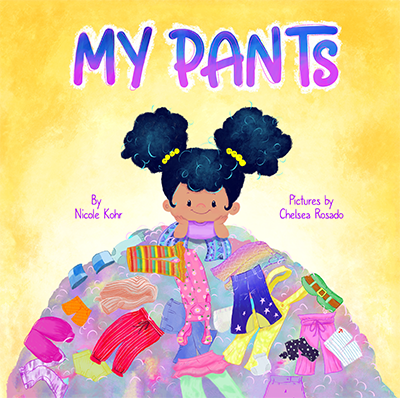 My Pants
My Pants
As a parent and a self-diagnosed person on the spectrum, I've read a lot of picture books about kids with autism and related conditions, but none were as satisfying, or full of love, as Nicole Kohr's My Pants. Chelsea Rosado's cozy and colorful illustrations show that neurodiversity can be a source of pleasure, a talent for finding wonder in the mundane.
The protagonist of My Pants is a little girl named Celana with light brown skin, flamboyantly poofy hair, and a special interest in...you guessed it...pants. Like Amelia Bedelia, she takes idioms literally, and finds it perplexing that other people don't just say what they mean. Her attempts to decode everyday expressions give her a creative perspective on language. (Maybe she'll grow up to be a writer!) She's emotionally expressive and has a social life, including membership on a Little League team, but is also prone to worry about unexpected events or overwhelming sensory stimuli.
The typical autistic character in books and movies is almost always male, with a flat affect, disinterest in or difficulty with making friends, and a special interest in machines or numbers. This incomplete representation leads to delays in diagnosis for many folks whose neurodivergence manifests differently, especially those assigned female at birth. Celana was the first picture-book character I could see myself in.
Celana's interest in pants provides an entertaining through-line. This isn't just an "issues" book. Any kid can relate to the good feeling of choosing an outfit that's comfortable and makes you feel more like yourself. Celana's creative fashion choices give the book visual interest. There's also the fun of using wordplay to cut unfriendly adults down to size:
"She just needs more discipline," the doctor said. Mom grabbed my hand, and we left. Mom said the doctor was too big for her britches. That's silly. The doctor seemed skinny to me.
It's remarkable how many idioms in the English language relate to pants! I can imagine using this book as a prompt for a word game with kids: how many common phrases can you name with a certain theme? Lacking the context we take for granted, children are curious about the origins of our slang expressions. Instead of shutting down these questions, we can use them as teaching moments and learn to think twice about using clichés.
My Pants also teaches adults a valuable lesson about ableism. Celana's parents are stellar advocates for her. The first two doctors they consult to help Celana with her anxiety and attention issues are unsympathetic. One accuses her of having a behavioral problem, the other touches her too much and says the parents should make her socialize more. These unhelpful judgments are all too familiar to me, as a parent and a patient. Luckily, her parents are always on her side, and find a doctor who appreciates her differences. Instead of trying to change her, he gives her empowering strategies for creating a routine and a safe place to decompress.
The physical book had good color reproduction, no typos, and a large typeface that was easy to read. However, the pages were thin and tore easily. We wondered if the illustrations about Celana's anxieties might be too visually busy for children with sensory processing issues. The sketchbook prompts in the back were a fun addition.
Read an excerpt from My Pants (PDF)
Buy this book on Amazon









